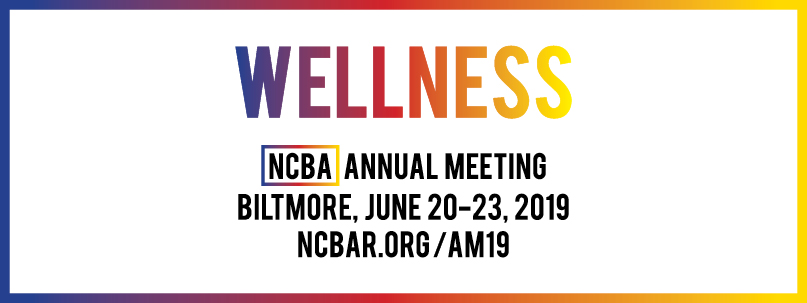Wellness Expert Jeena Cho On Lawyers, Self-Care and the Billable Hour
This year’s NCBA Annual Meeting theme is wellness and how legal professionals can achieve it. In preparation for the event, we talked with speakers scheduled to present at Annual Meeting for a series of quick-read Q&As. Watch NCBarBlog for upcoming Q&As with Annual Meeting speakers Stan Phelps, Laura Mahr and Greg Romeo. Admission to all speaker presentations, including those for CLE credit, is included in registration.
NCBA Annual Meeting 2019
Jeena Cho on Better Lawyering Through Mindfulness
Friday, June 21
1.0 hr of CLE credit
Find more details about Annual Meeting and registration here.
As a partner in a San Francisco bankruptcy firm, Jeena Cho understands that the pressures lawyers face are unlike those faced by others in high-stress occupations. That’s one reason she is such a valuable resource for legal professionals.
A co-author of “The Anxious Lawyer” and a frequent contributor to Above the Law, Cho earned her law degree from the University of Buffalo. She began her exploration of mindfulness in Buffalo as well, attending the Himalayan Institute for meditation training. Cho teaches mindfulness and meditation to lawyers and counsels firms on stress management and work-life balance.
Q: What unique challenges do lawyers face when it comes to self-care?
A: A few common challenges I’ve observed: First is that lawyers think self-care is antithetical to lawyering. There’s a myth that lawyers should work all the time and sacrifice their well-being for their clients and career. I’ll often have lawyers push back and say, “If I take an hour to go to the gym, that’s an hour I won’t be able to bill.” That’s a short-sighted view, of course, because heaving a healthy body is a foundation to being a good lawyer.
Second is that lawyers experience guilt when they take time for self-care. I especially find this is the case with the mom lawyers. They feel as though they must spend 100% of their time either at work or with the family. A common feeling is that they’re “failing” all the time. The mom lawyers feel as though they’re failing when they’re at work because they aren’t being a good mom and they’re failing when they are at home because they aren’t being a good lawyer.
Lastly, the billable hour. As mentioned above, the billable hour creates the myth of zero sum where every minute not spent billing is potential revenue lost without much consideration to the quality of those hours.
Q: What makes the anxiety that lawyers face more intense or different than what professionals in other high-stress fields experience?
A: Lawyers generally work in an adversarial situation where the stakes are very high. Either my clients win or my clients lose. This environment is ripe for incivility, hostility, underhanded behaviors as well as stress and anxiety.
A surgeon, for example, is also under a lot of stress, and her success is also critical. However, her entire team, everyone involved in the surgery is working toward a successful outcome.
As one lawyer said to me, “Being a lawyer is like being a surgeon where half of the team is actively trying to kill your patient.”
Q: What makes mindfulness such an important tool for attorneys who are battling anxiety?
A: Being mindful means being in the present moment with awareness. The ability to slow down, fully notice what is happening in the moment creates a window of opportunity to make wiser decisions and respond more appropriately. It also creates a space where we can be more compassionate towards ourselves and others.
For example, I used to feel incredibly angry with myself when I lost a case or didn’t get the outcome my clients were expecting (which ironically can happen even though the client technically “won.”) I would replay everything that happened in the case over and over again, like a broken record. I would also judge myself and be incredibly harsh. This is, of course, not good for mental well-being.
Now, with mindfulness, I can step back, look at what happened with more clarity. I am able to see where I could’ve perhaps done things differently, learn from my mistakes, forgive myself, and also give myself credit for showing up and doing my best. Most importantly, I am able to let go of the negative self judgement and criticism.
Q: What are the first steps to take on the path toward mindfulness?
A: Start with a very short daily meditation. Here is a good starting guide.


 By
By